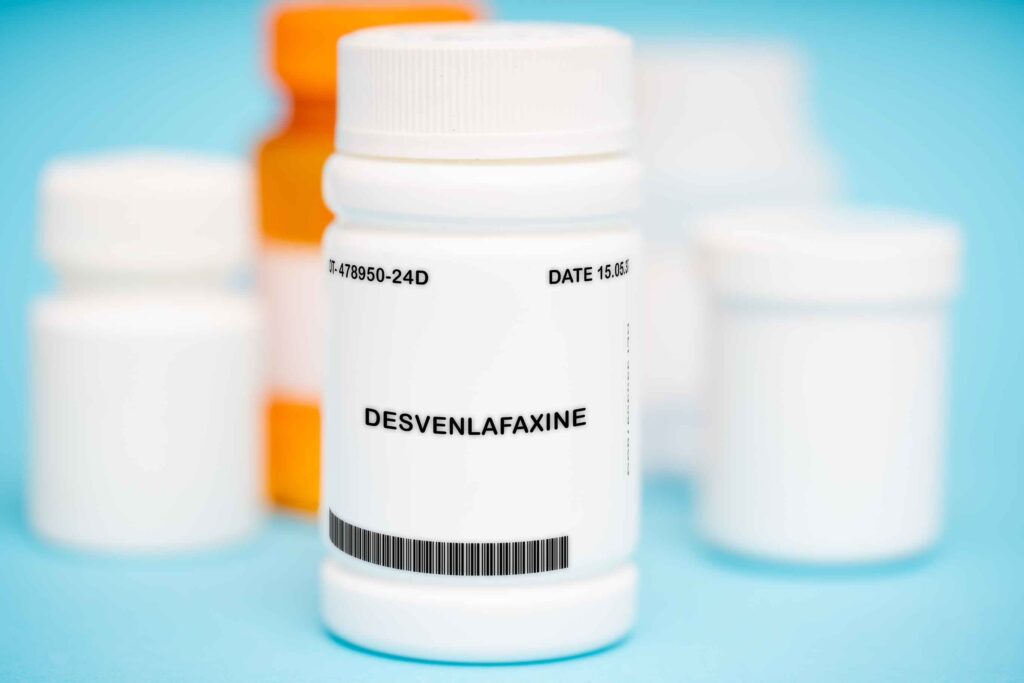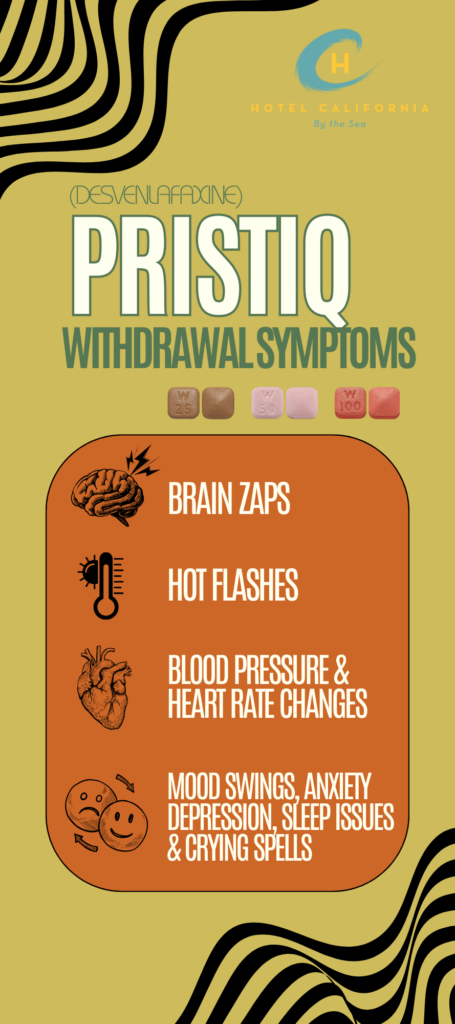Pristiq Withdrawal Symptoms
Major depressive disorder is a serious mental health condition often referred to simply as depression. When diagnosed with depression, medications such as SNRIs and SSRIs are known antidepressants that can help treat symptoms of the condition. One brand of serotonin-norepinephrine reuptake inhibitor (SNRI) is called Pristiq. Similar to other antidepressant medications, users of Pristiq can develop withdrawal symptoms. Even when taken as per the recommendation of a health care provider, antidepressants like Pristiq can cause withdrawal symptoms when the medication is stopped or there is a sudden change in dosage.

When the body has become accustomed to medication, it begins experiencing symptoms due to chemical changes in the body. This is due to a dependence on the drug. When this occurs with Pristiq or other antidepressant prescription medications, it is also known as antidepressant discontinuation syndrome. Pristiq withdrawal occurs in about 20% of patients who stop taking an antidepressant abruptly after at least 4 weeks on the medication.
Withdrawal symptoms can be uncomfortable and difficult to manage. It can lead to symptoms such as dizziness, tremors, confusion and headaches. It is best to consult with your healthcare provider to come up with a gradual taper plan to slowly reduce dosage over time.
What is Pristiq?
Pristiq is the brand name of the generic drug desvenlafaxine. Pristiq is a timed-release serotonin-norepinephrine reuptake inhibitor that is FDA-approved to treat major depressive disorder. It is also often prescribed for many off-label uses. The drug works by increasing the levels of serotonin and norepinephrine in the brain and has been proven to be effective in treating depression.
Serotonin and norepinephrine are natural neurochemicals in the brain that help maintain mental balance. Pristiq stops the process that breaks down these chemicals. The process of reuptake. When the medication blocks the reuptake of these chemicals, it increases the amount of chemicals available in the brain.
Some studies have also found that for long-term use, the medication is effective for longer-lasting treatment without the risks of relapse.
When abused, the medication is often referred to as poor man’s cocaine. The user often crushes and snorts the substance in an attempt to experience a similar rush to the stimulant cocaine. Pristiq is not approved for use in children, teens, or young adults under the age of 25. Because of this, it is not a popularly prescribed antidepressant compared to others.
Common side effects of Pristiq
- Nausea
- Dry mouth
- Fatigue
- Dizziness
- Sweating
- Constipation
- Reduced appetite
- Sleepiness
- Insomnia
- Suicidal thoughts and behaviors
- Worsening depression and anxiety
- Panic attacks
- Aggressiveness and irritability
- Extreme levels of excitement
- Tremors
- Hallucinations
- Seizures
- High blood pressure
- Bleeding more than usual and bruising more easily
- Lung issues and difficulty breathing

Antidepressant Discontinuation Syndrome
What causes Pristiq withdrawal? The main factors that can cause withdrawal symptoms include dependence on the drug, tolerance for the drug or a reduction or change in the dose of the drug. When you suddenly stop taking the medication, it can cause withdrawal. When you miss a dose and take your medication off schedule, it can cause withdrawal. When you drastically reduce your dosage or change up your dosage, it can cause withdrawal.
Pristiq is not classified as or generally considered to be an addictive substance. However, it can cause physical dependence when there are drastic changes in how you take your medication. Some users can experience withdrawal symptoms that can last anywhere from months to a year.
Pristiq Withdrawal Symptoms
- Nausea
- Sweating
- Dizziness
- Headache
- Agitation and mood swings
- Anxiety
- Confusion
- Sensation of pins and needles
- Insomnia and abnormal dreams
- Tremors
- Seizures
- Changes in mood and low mental energy
- Suicidal thoughts and behaviors
- Mania and psychosis
- Brain zaps
- Changes in blood pressure
- Blurred vision
Check Your Insurance Coverage for FREE
Find out if your insurance covers addiction treatment in minutes. We accept most insurance!
Factors that Influence Withdrawal
There are many different factors that can influence the aspect of Pristiq withdrawal. The length of time in which you have taken the medication is important. The longer you’ve been taking the medication, the more likely you will experience withdrawal symptoms when there is a change in dosage. There is a significantly high chance if you have been taking it for more than 6 weeks. Your medication dosage impacts the severity and duration of withdrawal. Stopping Pristiq at a higher dose is more likely to lead to severe withdrawal symptoms.
If you are taking other medications alongside Pristiq, it can also influence drug withdrawal. Sometimes, it can increase the severity of symptoms. Finally, having social support it important. Having a network of supportive friends, family and colleagues can help you to better manage your withdrawal symptoms.
Pristiq Withdrawal Timeline
Pristiq withdrawal symptoms can begin to appear within the first 24 hours after medication has stopped. Once withdrawal starts, it can last anywhere from a few days to a few weeks. The majority of physical symptoms such as nausea, difficulty sleeping and headaches should resolve shortly after withdrawal has begun. Other symptoms related to mood changes such as relapsed depression and anxiety, can take longer to resolve.
In the first 3 days, initial withdrawal symptoms will begin and include anxiety and irritability. In the first 1-2 weeks, symptoms will most likely begin to peak. They include headaches, nausea insomnia and sometimes flu-like symptoms. Within the 2-4 week period, symptoms will gradually decrease in intensity with some people still experiencing mood swings, brain fog and fatigue. During the 1-3 month mark, the majority of acute symptoms will disappear with some continuing to experience mild symptoms such as dizziness and mood changes.
In extreme cases when symptoms last longer than a few weeks, it can be considered post-acute withdrawal symptoms (PAWS). In other cases, there are some people who can still experience withdrawal symptoms such as mild cognitive issues, up to 6 months post medication cessation.
Dangers and risks of Pristiq
- Brain Zaps. Brain zaps are a common occurrence when coming off antidepressant medications during withdrawal. A gradual taper can help manage or avoid brain zaps altogether. Brain zaps are feelings of electrical currents running through your brain. It is associated with lateral eye movement, but still remains largely misunderstood by researchers. There is no medical explanation beyond what has been observed in those who experience brain zaps.
- Serotonin Syndrome. Serotonin syndrome is a drug reaction when levels of serotonin are raised to dangerously high levels. It can cause symptoms such as agitation, hallucinations and seizures.
- Steven Johnson Syndrome. This condition is a rare but severe type of reaction that results in hives caused by certain medications that target moist tissues in the mouth, eyes, throat and airways. It causes flu-like symptoms followed by the skin erupting in blisters and a rash. Users can also experience dehydration, sepsis, pneumonia and organ failure.
Reach out to Hotel California by the Sea
We specialize in treating addiction and other co-occurring disorders, such as PTSD. Our Admissions specialists are available to walk you through the best options for treating your addiction.
Treatment of Substance Use Disorder
Pristiq is an antidepressant prescription medication approved for the treatment of depression in adults 25 and over. It is not considered an addictive substance but it can cause physical dependence and the development of uncomfortable withdrawal symptoms. This usually occurs with discontinuation of the medication or a change in dosage.
To manage or avoid severe withdrawal symptoms, it is recommended to gradually taper off the medication. This is usually done in a clinical setting under the guidance of a healthcare provider. Behavioral treatment programs such as Hotel California by the Sea provide specialized detox and taper methods to help clients coming off antidepressant medications like Pristiq.
We provide treatment at all levels of care including detox, residential, PHP and IOP. We utilize evidence-based methods such as CBT, DBT and EMDR therapy. Hotel California by the Sea is dedicated to helping clients understand the root cause of their drug dependence and help them overcome their addiction to substances.
References:
https://www.medicalnewstoday.com/articles/drugs-pristiq
https://www.ncbi.nlm.nih.gov/books/NBK534829
https://www.healthline.com/health/drugs/desvenlafaxine-oral-tablet
https://www.alternativetomeds.com/blog/pristiq-withdrawal
